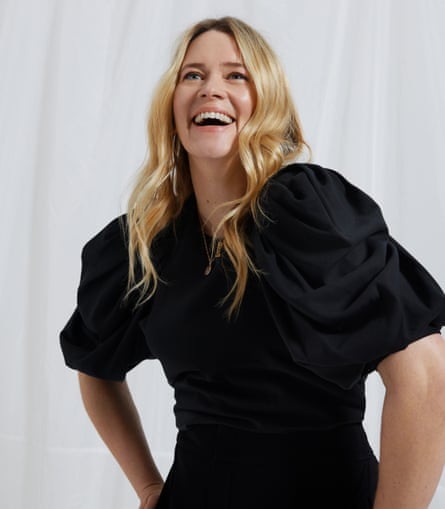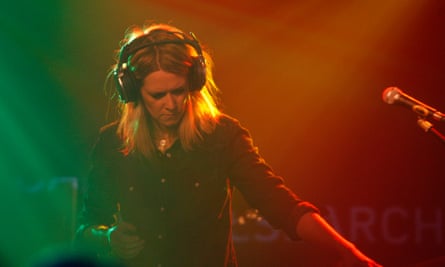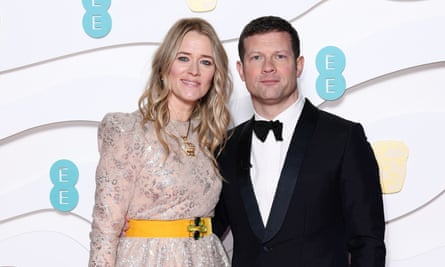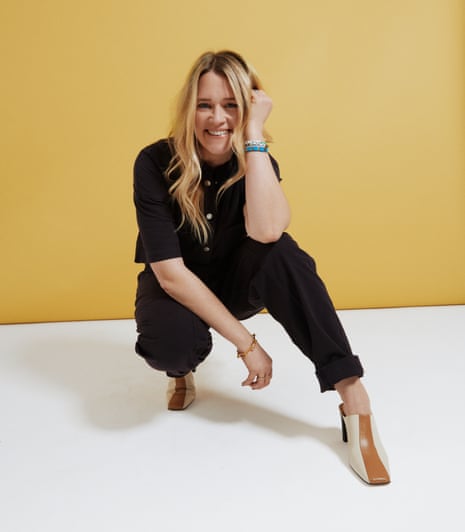There’s this way professional talkers talk, and Edith Bowman’s at it. I have barely sat down and she’s in full swing, chatting about a case of cleavage envy aimed at Peloton instructor Hannah. The hair and makeup on a just-wrapped shoot was fabulous; that orange she’s spitting out is too bitter. Do I live locally?
Great interviews, Bowman believes, cut through tension. As a presenter, she crowdsourced guest greeting ideas from listeners to “cuddle a Clooney” and “rub a Renee” (Zellweger); “Give Rob a Hobnob” bemused Robert Downey Jr.
She’d arrive at junkets with a pre-prepared film critique to get an actor engaging. “I once read Julia Roberts my bit, and she looked at me and said: ‘You didn’t write that.’ I stared her square in the eye and told her I bloody well did.”
There’ll be no need for me to break the ice today, then. Bowman’s melting efforts show no sign of stopping. We’re yet to do introductions, but I’m already picking up the pair of Grenson boots she’s just kicked off as she gets comfortable on the west London studio sofa – I honestly won’t believe how light they are.
It’s no great surprise that Bowman’s a seriously skilled silence-filler. At 47, she has, after all, spent the best part of three decades holding court for a living on some airwave or other. In the early 2000s that recognisably rich Scottish voice of hers was a Radio 1 mainstay, while various TV presenting gigs secured her face the same level of exposure. For the past few years, her podcast, Soundtracking – a weekly film and music interview show – has been her passion project and primary focus. It’s not the only change she has made.

In December 2019, just months before the pandemic, Bowman, husband Tom Smith – frontman of British rock band Editors – and their two kids packed up their things to move out of London. A mutual friend had set the couple up in 2005 and they’d locked eyes over a picnic bench. The rest of the story, she says, is far too sickly.
During a weekend in Gloucestershire with her in-laws, the couple had decided to look at houses in the area on a whim. They fell in love with their new home that same weekend and soon swapped the city for a rural idyll.
“One of the main reasons was to separate work and home a bit more,” she says, “then cut to a few months later and I’m running off from dinner to Zoom, because suddenly everyone is constantly accessible.” Now, they each have their own home studio, and moonlight doing production work for the other. In lockdown she’s created Smith’s new album art and filmed his set on an iPhone for the Late Late Show with James Cordon.
A week after we meet, Bowman will host the 2021 film Baftas. After years of fronting the televised red-carpet coverage with Dermot O’Leary, this year the pair have been tapped on the shoulder. And she’s buzzing. Most of the preparation so far has been focused on keeping her mum, Eleanor, hydrated: her tears of joy won’t stop flooding. Bowman’s having regular calls with her co-host, to work out how they’ll inject energy into an empty Royal Albert Hall, with virtual nominees and no live crowd to buoy them.
“I’m used to intimacy,” says Bowman, “so am actually quite pleased that nobody will be there.” Years spent broadcasting from small studios means if anything she’ll find it more comfortable than having to stand in front of a star-studded audience.
“Whether it’s TV, radio or podcast,” she says, “I don’t think about how many are listening or watching. The best advice I received when I started out was to think about the camera or microphone as if it was a person to connect with. That’s how I’ll have to approach it on the night, mostly to stop myself vomiting all over Dermot.”
Everything she has done in the past few years, she says, feels like it has been leading up to this moment. Bowman’s beaming, and takes a breath to soak up the excitement. Right, I think: here’s my chance to ask a question.
Bowman grew up in Anstruther, a small fishing village in Fife, to the east of Scotland. What started as her grandad’s small B&B had become a sprawling 50-room hotel by the time baby Edith joined the clan, so hers was a childhood, she says, enriched by culture and colour. “It was this amazing environment full of people from all over the world,” she says fondly. “I was exposed to much more than most who grew up in the 80s in little coastal villages.”
There were jazz bands, radio roadshows and dinner dances on Saturday night. And hard graft, too: in the kitchens, changing linens, and scrubbing toilets.
An electrician by trade, Dad – like most who married in – gave up his job to join the family business. Bowman’s love of film, she thinks, can be traced directly back to being sat behind the desk with him, dishing out tickets at their Saturday morning hotel cinema using his projector.
Mum and her six sisters instilled Bowman with their work ethic, but in adolescence she was restless. A self-described nightmare teen, there was bus-stop boozing and school slip-ups; underage nights out on Dundee’s dancefloors offered her a whiff of sweat-drenched freedom. Watching guests come and go made her desperate to experience something beyond the quiet community’s North Sea horizon.
“I failed all my Highers in fifth year,” she says, “that whole year I didn’t care, I wasn’t bothered.” Opening up the results was the jolt she’d been needing. “I suddenly thought, ‘Shit: if I don’t pull something together my options will be even more limited.’”
Enrolling on a communications studies course at college would be her salvation. The media and marketing modules gave her a taste for broadcasting, and something clicked.

“Radio was always a doorway to something for me growing up,” she says. “Mum and Dad had a great record collection and there were bands at the hotel. But to find my own thing in our small fishing village? It was radio and its music.”
She’d tune in religiously to Nicky Campbell, Simon Mayo and John Peel. “I’ll always remember listening to Mark Radcliffe playing Sonic Youth. I felt this instant connection, it offered me a peak behind a curtain into this world that I’d never experienced. I wanted to be part of it.”
In the summer before starting university in Edinburgh, Bowman bagged some work experience at a local station. Having written so many letters that had gone ignored, she reckons they only asked her in to halt the bombardment. Having shown her worth, she was offered part-time work. Her new boss asked what her hopes for the future were. What she wanted most, the 20-year-old said, was her own show on the station.
“He was sitting behind his desk,” she recalls, “and just looked at me and said: I could never put someone with an accent like yours on the radio.” She felt tears welling up in her eyes and walked home sobbing. “It was gutting,” she says, “he was being derogatory to a whole area, a whole community of people. And my voice – how I speak – is who I am. Sod that, I thought, dictating my prospects.”
By the time Bowman graduated, she had two primetime presenting shows on that same station. With no full-time work in the city, she applied for every industry job going in London. “I sent my reel to everyone, and got nothing,” she says. “Mum has a folder full of all the rejection letters: Sky, the BBC, production companies. Quite a number of them said I should go and get elocution lessons.” Thanks very much, Bowman thought, but no: she had already proved that wouldn’t be necessary.
For 20 years, Bowman carved out a career in the capital. MTV had given her a job as a newsreader, her first national gig. She picked up presenting work for Capital FM, the BBC and Channel 4, before arriving in a Radio 1 studio in 2003. She and Colin Murray did weekends until the pair were promoted to midweek afternoons. Those heady days were glorious, from what she can remember.
“There are a couple of Radio 1 years that I fully have no recollection of,” she says with no hint of regret. “When Colin and I started our daytime show we just went for it. The night before our first one we were watching Primal Scream in Glasgow and got the sleeper train back. We lived it and that was important.”
Two years later, Murray moved to Five Live. She was called in by execs, and braced herself for the news that it was over. “I was fully expecting to be sidelined,” she says, “but instead I was given my own show. I didn’t expect it. I didn’t know why they’d want me.” When I ask why, Bowman’s flow for the first time slows a little.
“I don’t know… Maybe I have a low opinion of myself? It’s like I always have something to prove, a lack of self-confidence. I like to think I don’t have that… but I guess I do? Stick me on a Zoom with Hollywood stars and I’ll be shitting myself, but I can do it. But when it comes to other people’s thoughts on me, making judgments, I struggle.”
That’s a tricky trait to have, I say, when you’re in the business of popularity and ratings.
Still, she dived in headfirst, and for a few years things went swimmingly. And then in 2009, bosses at the Beeb called her in again. This time to be told she’d be heading back to weekends.
“That was really tough,” Bowman says. “There was no real reason. It wasn’t that my ratings had slumped. It was particularly hard to hear it from Ben [Cooper, then controller of Radio 1], because we’d discussed what my journey at Radio 1 could have been, and this wasn’t what we’d talked about.” What was the plan? “I’d rather not go into specifics, but it felt like I was being pushed aside.”
She was already feeling vulnerable, having come back from maternity leave only a few months earlier. Determined to prove something, mostly to herself, she’d presented the BBC’s Glastonbury coverage eight days after her C-section. “We got a little fridge from Argos and put it into the production office. When Chemical Brothers were on, I was told we had 12 minutes clear. I waddled down to the office, expressed, and waddled back so I wouldn’t leak on telly.”

Becoming a mother, she says, had thrown up questions at first about her identity. “Doing Glastonbury reaffirmed in me having a kid wasn’t changing me,” she explains. “My responsibilities were shifting, yes, but my career still mattered, I remained the same person.”
It made the news of her move even harder to cope with. “I never asked why,” Bowman says, “I was busy crying in that meeting, heartbroken. And I was a new mum, so there were obvious thoughts at the time: is it because I’ve had a kid? It took a long time for me to pick myself up again.”
In 2014, after a few other slots, her time on Radio 1 was over. After giving it her all, that must have been hard to swallow. “I felt it was the right time.” An uncharacteristic pause. “While there I didn’t just have the blinkers on. I was building relationships elsewhere and forging new avenues.”
Does a part of her wish she was still in the building, though? Jo Whiley, Sara Cox and Zoe Ball are all her contemporaries, between them covering most of Radio 2’s primetime offerings.
“I don’t think about what could have been,” she says. “I’m lucky that I’ve fluttered across so much of BBC Radio… I feel like a butterfly, I like to keep things moving.”
It’s why, for Bowman, the Baftas gig feels so significant. After being moved on from the BBC, then quitting her Virgin radio breakfast show after clashing with a new boss, it’s proof that she made things happen regardless. She built her podcast from scratch to amass 5m downloads, and created a space for herself in the film world, successfully setting up in a way that gives her control, no longer at the whim of executives.
There’s a cab waiting outside, and Bowman needs to jump in. In the car to the Baftas, I ask, what will she be thinking?
“That I did it,” she says, the pride palpable. “I’ll be on the Royal Albert Hall’s stage because I deserve it and put the work in.” You can’t help but be chuffed for her. “I want to make Mum and Dad glow, all the people who’ve believed in me. And even if they do need to give me subtitles, I’ll be speaking in my voice, with this Fife fucking accent.”
Edith Bowman will present EE Baftas 2021 tonight on BBC1. Soundtracking with Edith Bowman is available on all podcast providers
Stylist Bemi Shaw; photographer’s assistant Jack Storer; makeup by Amanda Grossman at The Only Agency using Kosas Beauty and Votary skincare; hair by Oli Brewer at George Northwood using Undone by George Northwood; shot at Loft Studios
